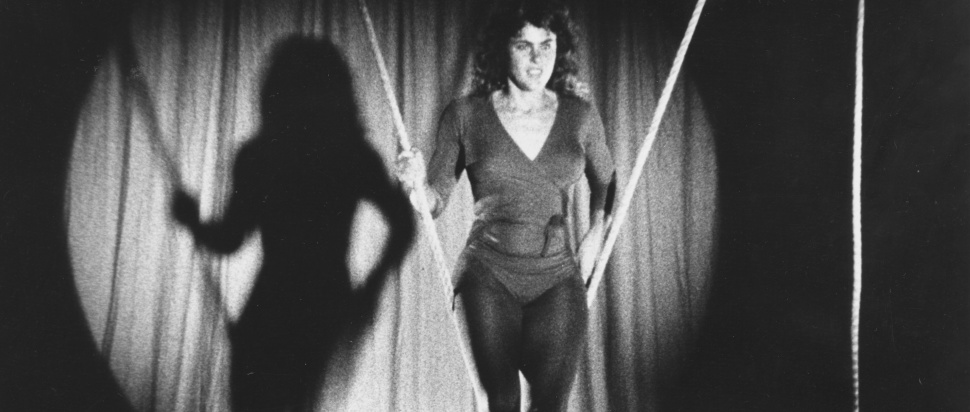Kim Knowles on EIFF retrospective Reframing the Gaze
Kim Knowles introduces EIFF's Reframing the Gaze retrospective which responds to the 50th anniversary of the festival's legendary 1972 Women’s Event
Fifty years ago, Edinburgh International Film Festival hosted its highly influential Women's Event. Helmed by revolutionary film theorists Laura Mulvey and Claire Johnston alongside EIFF programmer and future Artistic Director Lynda Myles, it was the first major celebration of work by women filmmakers by a European film festival. To commemorate its 50th anniversary, EIFF has themed this year's edition around that landmark Women's Event, and will include the wide-ranging retrospective Reframing the Gaze: Experiments in Women’s Filmmaking, 1972 to Now.
Curated by Kim Knowles, this retrospective gazes backwards – and forwards – at the intertwined evolution of feminist filmmaking, experimental filmmaking, and the festival itself. Groundbreaking films by Chantal Akerman, Barbara Hammer and Mulvey herself are among those included, while the most recent work is the 2019 feature So Pretty, an intimate drama drawing us into the romantic imbroglios of four young queer and trans people in modern-day New York from American filmmaker Jessie Jeffrey Dunn Rovinelli.
We speak to Knowles about her approach to curating this programme, and the transformative power of experimental film.
What has been the legacy of the 1972 Women’s Event?
The women that came together in the 1972 Women’s Event were crucial in shifting the debates about what form feminist filmmaking should take. You had Laura Mulvey, who put forward that feminist filmmaking should counter the patriarchal film form, and you had Claire Johnston, who argued that mainstream filmmaking created the potential for female filmmakers to come at a method of resistance from the inside. There were multiple positions on the history of feminist filmmaking, how to think about the present, and how to stimulate the future.
And as you know, Laura Mulvey has been the most incredible force in feminist film – for that reason, my programme starts with Riddles of the Sphinx, the film she made with Peter Wollen, as a springboard. It’s an incredibly exciting viewing experience, and I hope putting it on at the festival will break through the difficulty the film’s been associated with.
What guided your curatorial approach to the retrospective?
Although my programme looks back to 1972, it hops across numerous events I’ve been interested in: the 1972 Women’s Event, the 1976 International Forum on Avant-Garde Film where many female experimental filmmakers were present, and the Psychoanalysis and Cinema Symposium that same year. It’s quite a tricky retrospective because it takes a fairly unconventional approach. During the 1970s, Lynda Myles had quite a close relationship with the London Filmmakers’ Co-op, a centre of experimental filmmaking, so I was asking myself: what films might appear in the programme if Lynda Myles was directing the festival in the 1990s, for example? I’m hopping through the decades, but those decisions aren’t arbitrary – I’m asking myself different questions.
Did you discover any patterns of experimentation connecting the 1970s to now?
While in the 70s, there was a certain withdrawing of the self, one can see in the 80s and 90s that subjectivity is much more directly interrogated. Moving into the 2010s to a film like So Pretty, we have a more playful, self-reflexive questioning of the body, of representation, of identity politics. What I love about the programme is it takes us from this question of “what is women’s film?” to “what is film?” to “what is woman?”
So Pretty picks up the language of Riddles of the Sphinx with this panning movement of the camera – a non-objectifying gaze – to represent a domestic space that’s more fluid in terms of identity. Those films mirror each other, and use essentially the same language: one that doesn’t fix, control, or objectify, allowing experience to be constantly in process.
What makes experimental film form such a powerful terrain for resistance?
Some feminist film critics quite militantly argued that one can be radical within mainstream film form. However, I've always felt that it's by showing us things differently that we come to think differently: it's only when we don’t necessarily know what we’re looking at that we have our preconceptions challenged. [Academic] Scott MacDonald says in relation to experimental film that it “retrains perception”, and that can apply to the representation of women, of race, sexuality, and ecology – it all comes back to the same mechanisms. What I want is for these films to draw attention to what it is to “look”, to be aware of the cinematic gaze.
What are the responsibilities curators have in charting towards a more feminist film exhibition space?
Curators have a massive responsibility in that respect. I’m constantly asking myself if I’m doing enough. We need a more just, more ethical society – we need it desperately, and that means curators seeking out filmmakers and themes that question damaging patterns of behaviour. Film is a wonderful form of self-expression, of community, but I think increasingly, we’re going to have to question what role it plays in creating the world we want to live in.
Reframing the Gaze: Experiments in Women’s Filmmaking, 1972 to Now runs 14-18 Aug at Edinburgh International Film Festival
Full programme and tickets at edfilmfest.org.uk
